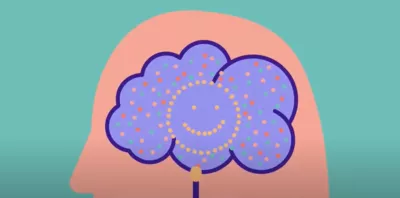
What is epilepsy?
Epilepsy is a neurological condition (a condition that is linked to our nerves or nervous system). It disrupts the normal electrical activity in our brains. This disruption causes repeated seizures.
An epileptic seizure happens when there is a sudden electrical discharge in the brain. This can cause changes in sensation, behaviour or consciousness.
Seizure symptoms depend on where in the brain this abnormal burst of electrical activity happens. As a result, there are many different types of seizures – most usually last from a few seconds to a few minutes and usually stop on their own. For some, epilepsy can be a lifelong condition, while for others it can slowly get better over time.
Having a seizure, or being present when someone else has one, can be scary and upsetting. Especially if it’s the first time having one. But with the right medicine and support, epileptic seizures can usually be controlled well.
Who can get epilepsy?
Epilepsy can affect anyone, at any age, from any background. But it usually starts either in childhood or in people over 60.
What are the signs and symptoms of epilepsy?
Seizures can vary from person-to-person. And how one person responds to a seizure may be very different to how someone else responds. This is because the brain controls a wide range of functions. And different types of epilepsy can affect different areas of the brain.
Possible symptoms of an epileptic seizure include:
- uncontrollable jerking and shaking, sometimes called a ‘fit’
- losing awareness and staring blankly into space
- becoming stiff (rigid)
- strange sensations, such as a ‘rising’ feeling in the tummy, unusual smells or tastes, and a tingling feeling in your arms or legs
- collapsing.
Talk to a doctor if you’ve noticed any of these symptoms in either yourself or a child or young person.
What to do if you’re worried about epilepsy?
If you think a child has epilepsy, contact their doctor straight away. You may be referred to a paediatrician (a doctor who specialises in child health).
A specialist doctor will probably ask you for some information about the child’s medical history and suggest carrying out some tests, such as scans, blood and urine tests. They may also ask about family history – this is because some types of epilepsy can run in families and may be caused by genetics.
If a child or young person has epilepsy, it’s important to get an accurate diagnosis as soon as possible so that they can start treatment. With the right medicine and support, seizures can usually be controlled and managed well. With some types of epilepsy, seizures may stop altogether as they get older.
Remember, having a one-off seizure does not necessarily mean that you have or will develop epilepsy. But if you’re worried, contact a health professional. They are there to help and support you.
Key facts about epilepsy
- Approximately 625,800 people in the UK have epilepsy – around 1 in 107 people.
- There are around 103,600 children and young people with epilepsy in the UK (aged 0-24). This is the equivalent of 1 in 200 children and young people.
- Epilepsy is more common in children and young people as they get older:
- 1 in 1,000 children aged 0-4 years
- 1 in 333 children aged 5-9 years
- 1 in 200 young people aged 10-14 years
- 1 in 133 young people aged 15-19 years
- 1 in 111 young people aged 20-24 years
- Epilepsy affects approximately 1 in 200 school-age children (aged 5-19).
- Most children will outgrow their epilepsy by their teenage years. For those who do not outgrow their epilepsy, it can usually be controlled well by anti-seizure medications.
- It is estimated that around 1 in 5 of people with epilepsy also have a learning disability.
- Up to 5 in 100 people with epilepsy have photosensitive epilepsy, which means their seizures are triggered by flashing lights. Photosensitive epilepsy is up to five times more common in children and young people than in adults.
- Each year in the UK, around 1,000 people die from causes related to epilepsy.

